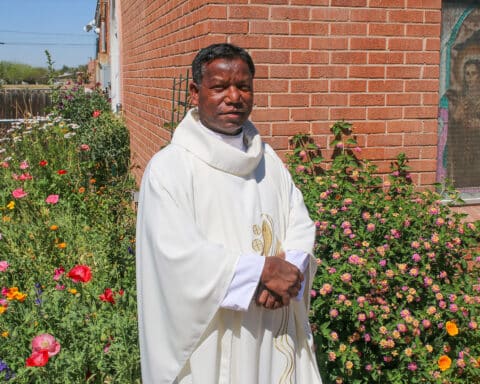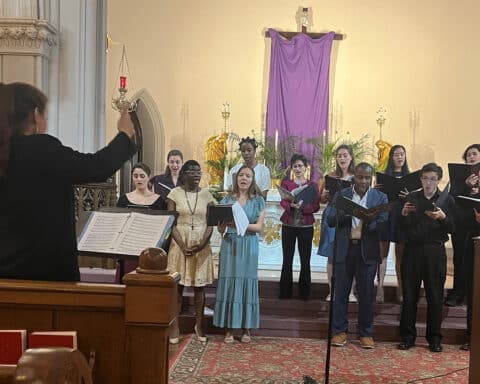
— Name, location withheld
Answer: When one says “15 minutes,” it is not always meant in an exact way. The idiom (or expression) is often meant to convey a time period shorter than a half hour, usually 15-20 minutes. How quickly one is able to pray the Rosary is variable. Private Rosaries can be quicker; Rosaries recited by a group may be a bit longer. My own norm for private recitation of the Rosary is about 20 minutes. A group Rosary here at the parish usually runs about 22-25 minutes.
The Rosary ought not seem like a “competition with the clock,” as you note. However, repeated prayers like Rosaries, chaplets and litanies are meant to move along; that is part of their character. While not a race, a good steady pace is helpful since groups pray best in that way. Private recitation can be very slow and meditative, if one wishes, but even then, a steady rhythm seems helpful to most.
As for Mother Angelica and the sisters being the gold standard, it is true their Rosary is quite reverent. However, recall that they are contemplative nuns and such a pace is more possible. Recall, too, that the broadcast spot may also play a role and that 25 minutes is just the right time to conclude in order for some promotional spots and then the next show at the bottom of the hour.
As for praying the Rosary in several parts during the day, this is certainly permissible. Ideally however, the Rosary is designed to pray the five decades together and this is usually the best and expected way.
Physicality of heaven
Question: What do we know about the “place-ness” — the physicality — of heaven? By place-ness, I mean that, since we’ll be reunited with our bodies, there must be some sort of physicality to heaven — even if our bodies wouldn’t be bound in the same ways they are now. It must not be just spirit and will.
— Rich Williams, Big Lake, Minnesota
Answer: Heaven is surely a place, and most certainly it is not merely a “state of mind.” So, heaven is inclusive of physical space. St. Thomas Aquinas taught that souls that depart this world are assigned corporeal (or physical) places: heaven, hell or purgatory. However, he notes that, prior to the resurrection of the body, they are not present there by quantity or dimension. This is because the soul, as purely spiritual, does not have weight or size. The soul is no more physical than a thought or idea. Nevertheless, the place they are assigned is a physical place, and this is fitting given that the true nature of man is to unite the material and spiritual worlds.
It is also fitting that heaven is a physical place since, as you note, our bodies will one day rise and be gloriously transformed. This requires physical space. Even now, the physical bodies of the Lord Jesus and Our Lady are in heaven and require physical space. Enoch, Elijah and, as some speculate, Moses, are all united to their physical body. This, too, presumes physical space.
Jesus descended to hell?
Question: What is the Church’s teaching about the three days during which Christ descended into hell? Surely God did not go to hell.
— Kathleen C., via email
Answer: No, Christ did not go to the hell of the damned. Rather, he descended to Sheol — sometimes called Hades, or the Limbo of the Fathers. This was the place where those who died in friendship with God and were awaiting salvation were detained. St. Thomas Aquinas notes that it is possible that the Limbo of the Fathers and the hell of the damned were in the same place, perhaps a higher dimension of that place, but they were not in the same state, (i.e., experience). They just suffered only from their longing for the Messiah, but the damned experienced hellfire. It was not to the damned that Christ descended, but only to those who explicitly or implicitly awaited his coming.
Msgr. Charles Pope is the pastor of Holy Comforter-St. Cyprian in Washington, D.C., and writes for the Archdiocese of Washington, D.C. at blog.adw.org. Send questions to msgrpope@osv.com.





